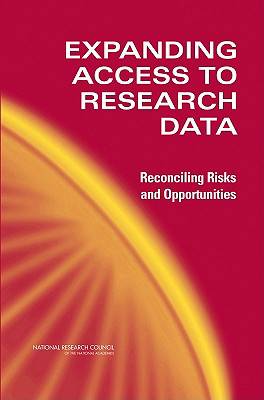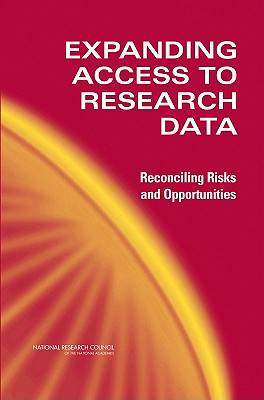
Je cadeautjes zeker op tijd in huis hebben voor de feestdagen? Kom langs in onze winkels en vind het perfecte geschenk!
- Afhalen na 1 uur in een winkel met voorraad
- Gratis thuislevering in België vanaf € 30
- Ruim aanbod met 7 miljoen producten
Je cadeautjes zeker op tijd in huis hebben voor de feestdagen? Kom langs in onze winkels en vind het perfecte geschenk!
- Afhalen na 1 uur in een winkel met voorraad
- Gratis thuislevering in België vanaf € 30
- Ruim aanbod met 7 miljoen producten
Zoeken
Expanding Access to Research Data
Reconciling Risks and Opportunities
National Research Council, Division of Behavioral and Social Sciences and Education, Committee on National Statistics, Panel on Data Access for Research Purposes
Paperback | Engels
€ 65,45
+ 130 punten
Omschrijving
Policy makers need information about the nation--ranging from trends in the overall economy down to the use by individuals of Medicare--in order to evaluate existing programs and to develop new ones. This information often comes from research based on data about individual people, households, and businesses and other organizations, collected by statistical agencies. The benefit of increasing data accessibility to researchers and analysts is better informed public policy. To realize this benefit, a variety of modes for data access-- including restricted access to confidential data and unrestricted access to appropriately altered public-use data--must be used. The risk of expanded access to potentially sensitive data is the increased probability of breaching the confidentiality of the data and, in turn, eroding public confidence in the data collection enterprise. Indeed, the statistical system of the United States ultimately depends on the willingness of the public to provide the information on which research data are based. Expanding Access to Research Data issues guidance on how to more fully exploit these tradeoffs. The panel's recommendations focus on needs highlighted by legal, social, and technological changes that have occurred during the last decade.
Specificaties
Betrokkenen
- Auteur(s):
- Uitgeverij:
Inhoud
- Aantal bladzijden:
- 132
- Taal:
- Engels
Eigenschappen
- Productcode (EAN):
- 9780309100120
- Verschijningsdatum:
- 11/12/2005
- Uitvoering:
- Paperback
- Formaat:
- Trade paperback (VS)
- Afmetingen:
- 154 mm x 229 mm
- Gewicht:
- 222 g

Alleen bij Standaard Boekhandel
+ 130 punten op je klantenkaart van Standaard Boekhandel
Beoordelingen
We publiceren alleen reviews die voldoen aan de voorwaarden voor reviews. Bekijk onze voorwaarden voor reviews.









